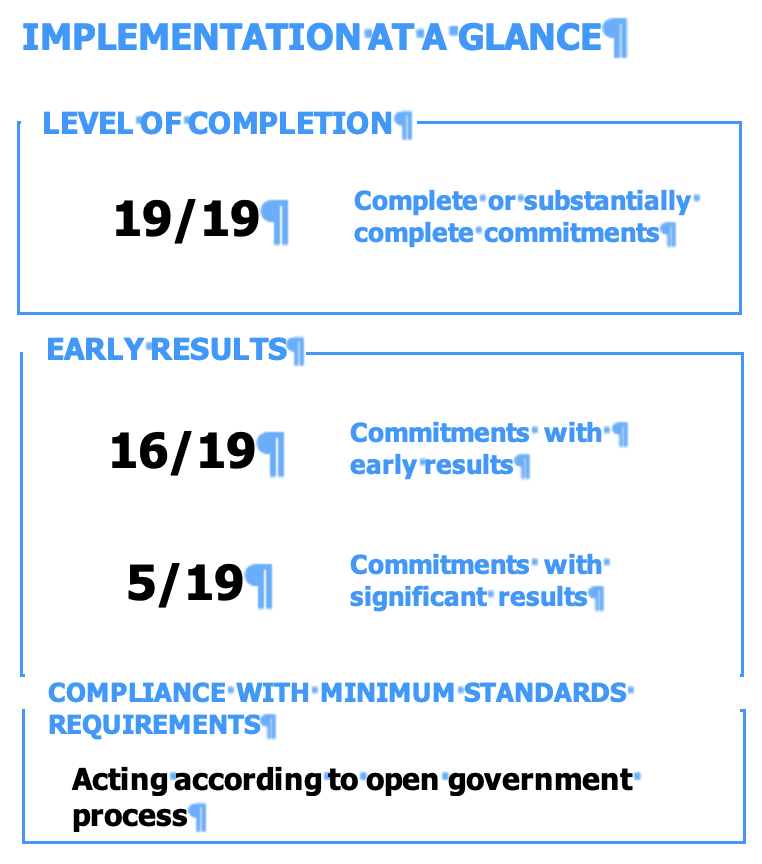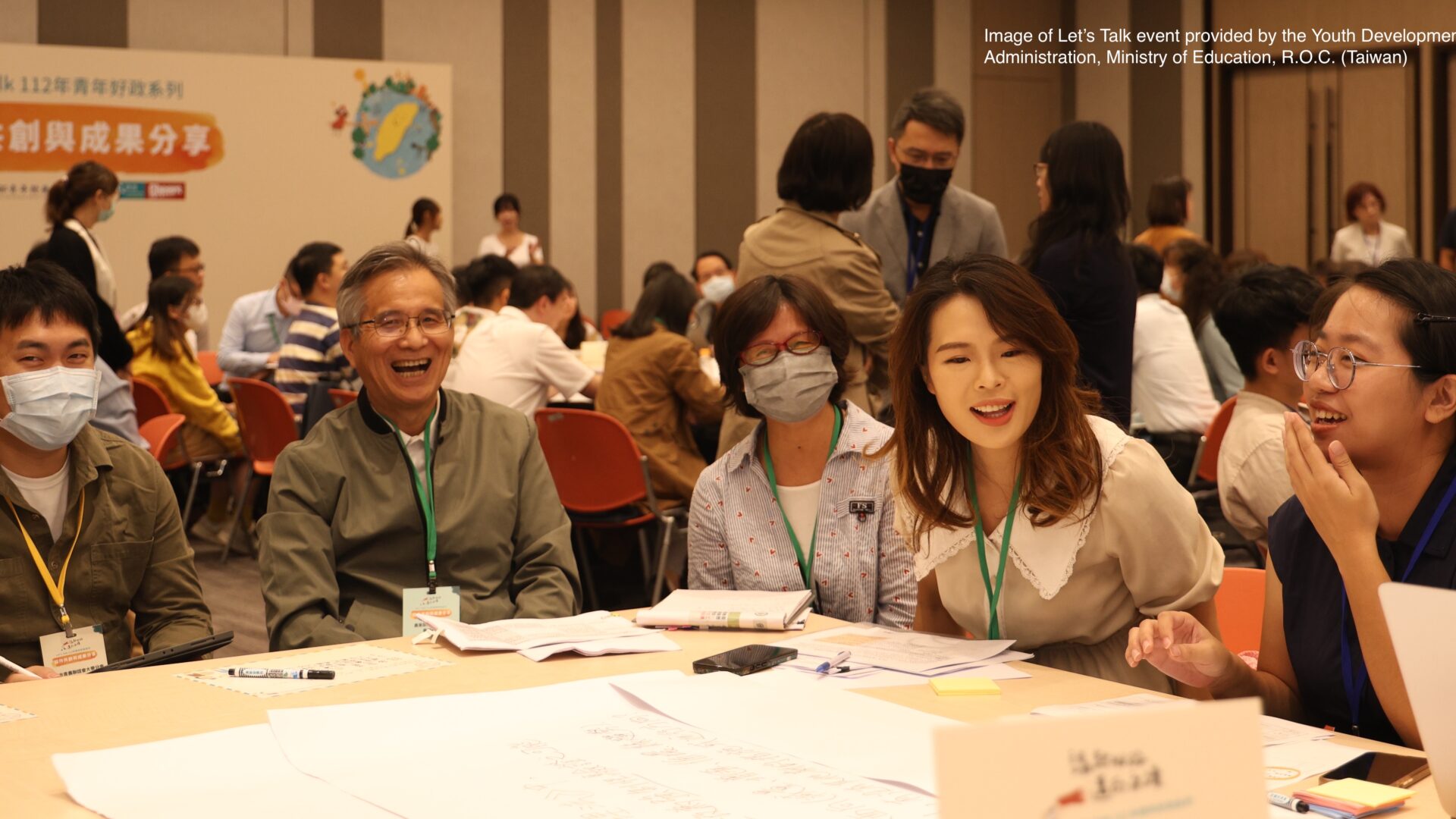The full and final version of the Independent Results Report is available as a downloadable PDF.
Note: the image of the Let’s Talk deliberative youth event used in the header of this page was provided with permission by the Youth Development Administration, Ministry of Education, R.O.C. (Taiwan).
Executive Summary
Taiwan’s first open government national action plan of 19 commitments of mostly existing work covered January 2021-May 2024. Open data and procurement integrity platforms and the youth public participation program have established strong infrastructure and networks, and legal and operational structures now protect long-term digital privacy and personal data. Civil society seeks an open government culture embedded across the civil service and all sectors, with government and civil society routinely collaborating to deliver permanent open government reform and results. Leadership by the Agency against Corruption and the Ministries of Digital Affairs, Education, Environment and Justice is a model for other countries.
Early Results
Notable positive and sustainable open government change is evident following completion of Taiwan’s national action plan. Five commitments already have significant early results. Two open data commitments and the youth participation and civics education cluster are creating long-term change in government practice and infrastructure. They are embedding collaboration with civil society into their daily work processes.

The government’s procurement integrity technical infrastructure and participatory processes have already increased public understanding of anti-corruption regulations and reduced political influence by external and internal parties. Significant civil society environmental group involvement has become possible. There are also signs of positive change resulting from work on personal data and identity, freedom of information, regional revitalization, gender and ethnic group inclusion, and political donation transparency.
Completion
All commitments were fully or substantially completed. Work forming labor unions, encouraging new immigrant participation, and promoting financial transparency of religious groups was substantially completed but has no notable early results, due to insufficient support by the Legislative Yuan, indications of public resistance, or a lack of public evidence of results. Active Ministerial and government support for the open data cluster was evident. The Presidential Hackathon, not an action plan activity, contributed to the cluster’s significant results through its use of the government’s open data to create new products and innovative solutions domestically and internationally.
Participation and Co-Creation
The Executive Yuan’s National Development Council (NDC) co-ordinates the open government program, assisted by the Open Government National Action Plan Taskforce of 25 members, appointed for two-year terms by the Premier.[1] The Taskforce met every four months during implementation.[2] Current civil society members, appointed in 2022, who were also placed in groups to work on specific commitments, reported having minimal opportunity to contribute to commitment implementation beyond attendance at the formal meetings. They seek training, discussion groups before Taskforce meetings, and greater opportunities to work collaboratively and provide specialist advice during their term on the Taskforce. They expect commitment leads to attend Taskforce meetings to hear what other departments have been doing and to learn from each other. They noted officials’ willingness to work with groups they are unfamiliar with, such as a wider range of indigenous community groups when implementing commitment 3-3.
Implementation in context
This first action plan followed Taiwan’s declaration at the Open Government Partnership Summit in Canada in May 2019 that it would work with civil society to draft an open government national action plan, while examining its direction and progress promoting open government as a stepping-stone for entry to the OGP which had been declined in 2015. Minister without Portfolio, Audrey Tang, a world-renowned open government influencer, initially drove this fully funded work. The Open Culture Foundation emphasized the importance of these initiatives for Taiwan domestically and internationally.[3] A concurrent Open Parliament Action Plan was coordinated by the Legislative Yuan.[4] Taiwan’s newly elected President, Lai Ching-te, was inaugurated on 20 May 2024. It is recommended that the Taiwan government considers options for regularly sharing its experiences with OGP member countries, for example, in the Asia/Pacific area. A first step could be attendance at the OGP Asia and Pacific Regional Meeting in Manilla on February 5-7, 2025, where they could discuss challenges, share successes, and plan future relationships.[5]
[1] Regulations for Establishment of the Executive Yuan Open Government National Action Plan Taskforce. National Development Council. Accessed 1 November 2024. https://ws.ndc.gov.tw/Download.ashx?u=LzAwMS9hZG1pbmlzdHJhdG9yLzExL3JlbGZpbGUvMC8xMzY5My8zNmE4NDE3ZC0zN2RmLTQyZWEtYTYzNy03NzUzZGU2ZDhlNDEucGRm&n=UmVndWxhdGlvbnMgZm9yIEVzdGFibGlzaG1lbnQgb2YgdGhlIEV4ZWN1dGl2ZSBZdWFuIE9wZW4gR292ZXJubWVudCBOYXRpb25hbCBBY3Rpb24gUGxhbiBUYXNrZm9yY2UucGRm&icon=.pdf.
[2] Open Government Repository. National Development Council. https://www.ndc.gov.tw/en/Content_List.aspx?n=0DA7FCB068C7ECF5. Accessed 1 November 2024.
[3] Taiwan takes actions on Open Government and Open Parliament and launches the 1st OGP action plan co-developed with civil society representatives. 20 June 2021. Open Culture Foundation. https://lab.ocf.tw/2021/06/20/ogp_taiwan-en/
[4] Taiwan Open Parliament action plan. Legislative Yuan. https://www.ly.gov.tw/EngPages/Detail.aspx?nodeid=45580&pid=219479. Accessed 31 October 2024.
[5] 2025 OGP Asia and Pacific Regional Meeting. Open Government Partnership. https://www.opengovpartnership.org/events/2025-ogp-asia-and-pacific-regional-meeting/ Accessed 1 November 2024.

